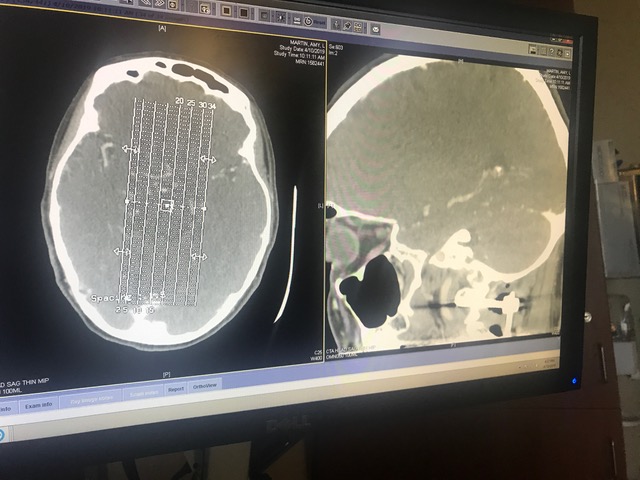chapter 3: Big Baylor on a Saturday Night

chapter 3 — early April 2019 | 3.30 min read
by Amy Martin
My brain awakens in a tiny room at Baylor, barely bigger than my gurney. Nearby doors open and close repeatedly, bursts of loud talking and idling ambulances infiltrate.
So happy to hear Scooter’s voice answering a question! A young female doctor is in charge, strong-voiced, cool-tempered, confident.

It’s after midnight on a Saturday night — emergency room rush hour. Disasters roll in by the minute. Someone screams in pain. Conflicts abound. Cops wrangle the worst of the madness. Orderlies and nurses handle the rest.
Then there’s me, a quiet women on morphine in a neck brace, a woman who is deeply loved, a woman who should be dead but isn’t, whose situation is critical but stable. A spot of calm in the chaos. Nurses check in as able.
Over and again, I roll in and out on the gurney for tests. Nurses relay the results to Scooter. Each one unveils a new twist. The broken C-2 looks like it exploded. A spinal artery is nicked and may be leaking.

Someone wonders: Surely something else has to be wrong. Why just this vertebra? More tests, full body scans. No internal damage, no other broken bones, just a suspicious blurry spot deep in my brain.
An unkempt older man staggers down the hall again, yelling incoherent demands to go home. Staff terms him a frequent flier. A petite nurse pushes him in the chest while scolding. He stumbles backward toward his room.
<><><>

I moan for ice, have drunk nothing since noon. Scooter appeals to the nurses. The answer is no. Too perilously close to the edge, could go into surgery at any time. The stomach must stay empty.
Three doctors talk intensely outside the room. The emergency room doctor lobbies for immediate surgery. At any moment something could shift and slice a vessel or nerve. We must stabilize.
Matt Black, a surgical resident, wants no action until the artery damage heals. He is quiet, dogged, insistent. If it breaks, blood will burst into the brain and spinal canal. It could be fatal.
Matthew Berchuck, the orthopedic spine surgeon, cuts to the chase: She’s made it this far, luck or something is with her. Get her in a bed, keep her there until Monday. I need my full team to fix this.
They scan for leaking blood and wait, scan again and wait. Roll in, roll out, the night deepens. Final verdict: no bleeding. Berchuck wins.
<><><>
I am bound for the trauma ward to stabilize. Transfer paperwork slowly percolates.

It’s nearly 4 am. Scooter breathes hoarsely as he tries to doze in a chair. He’s been on crisis duty for over 15 hours. The ER madness begins to abate. He snoozes.
My fingers trace along the cold metal edges of the gurney. It’s held dead bodies, too. I wonder about the people it has been home to, the pregnant, the dying, the mangled and bleeding. All reduced to a body on a rolling slab. `
An orderly arrives to roll me to the trauma ward. He is kind to Scooter, offers calming conversation. It’s a long dark bumpy passage through a maze of halls and elevators. I sink into confusion, lost again, slipping back into pain.

We turn into a small room. The orderly deftly tucks the gurney alongside the bed like he’s done it a million times. Scooter bustles. My confused mind decides Scooter and I have pulled in late after traveling and he’s unpacking and setting up the hotel room.
Nurses stream in, slide me onto the mattress, adjust the incline. They hook up IV tubes, monitor wires, catheter, morphine drip. A cacophony of beeps begins. A nurse slips a small sliver of ice in my mouth.
- chapter 4: The Lost Sunday (to be written)
- chapter 5: Operation Day (to be written)
- chapter 6: Post-op Re-entry
